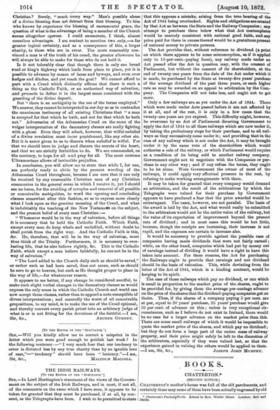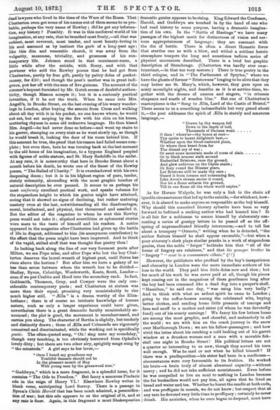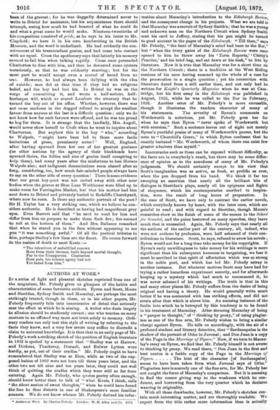BOOKS.
CHATTERTON.■ [SECOND NOTICE.] CilarrEnvox's mother's house was full of the old parchments, and certainly these may some of them have been actuallyengrossed by old • Chatterton's PoeticaliWork4 Edited by Rey. Walter Skeet. London: Bell and Daldy.
dead lawyers who lived in the time of the Wars of the Roses. That Chatterton even got some of his names out of them seems to us pro- bable, perhaps the very name of Rowley ; did he get any informa- tion, any history ? Possibly. It was in this mediaeval world of his imagination, at any rate, that he breathed most freely,—all that was noblest, most reverent, most tender, and most beauty-loving in his soul assumed as by instinct the garb of a long-past age ; like this dim and venerable church, it was away from the vulgarity, meanness, triviality, and grossness of his con- temporary life. Johnson stood in that muniment-room, little while after the suicide, with Bozzy, and with that pewterer who sold the Rowley poems that he had got from Chatterton, partly by free gift, partly by paltry doles of pocket- money, for £50; and though the poet's mother was in great indi- gence, put her off with the sum of five guineas. The account of the coroner's inquest furnished by Mr. Gutch seems of doubtful authen- ticity, though Masson accepts it ; but it is a curiously poetical invention, if it be not the truth. When he came into Mrs. Angell's, in Brooke Street, on the last evening of his weary wander- ings in London, after buying the arsenic from Cross and walking about all day with it in his pocket, no one knows where, he would not eat, but sat moping by the fire with his chin on his knees, muttering rhymes in some old unknown language. He then kissed Mrs. Angell—he had never done so before—and went up stairs to his garret, stamping on every stair as he went slowly up, as though he would break it, locking the door of his room behind him. If this account be true, the proof that his reason had failed seems com- plete ; but even then, here he was turning back at the last moment to the old home of his imagination, to a bygone England peopled with figures of noble stature, and St. Mary Redcliffe in the midst.
At any rate, it is noteworthy that here in Brooke Street about a month before his death, he wrote one of the finest of the Rowley poems, " The Ballad of Charity." It is overshadowed with his own deepening doom ; but it is in his highest region of pure, tender, stately solemnity, abounding with the most graphic touches of natural description he ever penned. It seems to us perhaps his most uniformly excellent poetical work, and speaks volumes for the stupendous height to which his genius might have attained, seeing that it showed no signs of declining, but rather maturing mastery even at the last, notwithstanding all the disadvantages, moral, intellectual, and physical, that threatened and assailed it.
But the editor of the magazine to whom he sent this Rowley poem would not take it ; slipshod scurrilities or ephemeral stories were more to the taste of himself and his readers. A notice appeared in the magazine after Chatterton had given up the battle of life in disgust, addressed to him (its anonymous contributor) to the effect that the poem might have been improved. And to think of the vapid, stilted stuff that was thought fine poetry then !
In looking back along the line of our very foremost poets after Milton, we see Pope arise, and after Pope who but the boy Chat- terton deserves the laurel-wreath of highest poet, until Burns has risen above the horizon ? But after him we have a galaxy of no less than seven between whom the wreath has to be divided— Shelley, Byron, Coleridge, Wordsworth, Keats, Scott, Landor- even if we put Crabbe and Hood into the secondary rank. In fact, Goldsmith, Thomson, Gray, and Cowper were the only con- siderable contemporary poets ; and Chatterton at sixteen was more than their equal, promising very unmistakably to rise much higher still. " /Ella " is a drama worthy of the Eliza- bethans; there is of course no intricate knowledge of human nature, such as only a longer experience could have given, nevertheless there is a great dramatic faculty unmistakably an- nounced ; the plot is good, the movement is unembarrassed, and carries you along. The character of Bertha is slightly, but tenderly and distinctly drawn ; those of /Ella and Celmonde are vigorously conceived and discriminated, while the working out is specifically poetic. The often-quoted song, " Oh ! sing unto my roundelay," though very touching, is too obviously borrowed from Ophelia's lovely ditty ; but there are two other airy, sprightly songs sung by
" the minstrels." A girl says to her lover,— "Once I heard my grandame say
Youthful damsels should not bo In the pleasant month of May
With young men by the greenwood tree."
" Goddwyn," which is a mere fragment, is a splendid torso, for it
contains " The Ode to Freedom." But fancy a sonorous Pindaric ode in the reign of Henry VI. ! Elsewhere Rowley writes in blank verse, anticipating Lord Surrey. There is a passage in Byron's Claude Harold that has been much admired, a personifica- tion of war; but this ode appears to us the original of it, and at any rate is finer. Again, in this fragment a most Shakespearian
dramatic genius appears to be rising. King Edward the Confessor, Harold, and Goddwyn are touched in by the hand of one who had read history to some purpose, having a dramatic imagina- tion of his own. In the " Battle of Hastings " we have many passages of the highest merit for distinctness of vision and ner- vous appropriateness of language ; they are resonant with the din of battle. There is often a direct Homeric force that startles one as with a blow, and withal a sublime heroic- atmosphere tempers the long and sometimes tedious series of physical encounters described. There is a brief but graphic description of Stonehenge. (Chatterton was hardly ever over- luxuriant,—in that too very mature.) There is true poetry in the third eclogue, and in " The Parliament of Sprytes," where we have the ghosts of former " Bristowans " longing to be alive that they may better see St. Mary's, which, however, they gaze upon on misty moonlight nights, and describe as it is at service-time, to- gether with the dresses of canons and singers, " in crimson chapeaux and scarfs of woaden blue." But one of Chatterton's• masterpieces is the " Song to Ella, Lord of the Castle of Bristol." There seems to us a something indescribable but very grand about it,—the poet addresses the spirit of Ella in stately and sonorous. language,—
Drawn by thy weapon fell Down to the depth of hell, Thousands of Dacians went
0 thou! whore'er—thy bones at rest— Thy sprite to haunt delighteth best,—
Whether upon the blood-embrued plain, Or where thou kenat from far The dismal cry of war ; Or seest some mountain made of cores of slain Or in black armour stalk around Embattled Bristowe, once thy ground, And glow arditrous on the Castle stairs ; Or fiery round the Minster glare, Let Bristowe still bo made thy care ;
Guard it from foemen and consuming fire,
Like Avon's stream enciro it round, Nor let a flame enharm the ground, Till in one flame all the whole world expire."
As for Horace Walpole, he was only a link in the chain of ignoble circumstances that led up to the suicide,—for which act, how- ever, it is absurd to make anyone so responsible as the boy himself. Why should this conceited literary sybarite have been so very forward to befriend a sucking author who had hoaxed him? It is all fair for a nobleman to amuse himself by elaborately con- cocting a series of gossipy letters to be passed off as the off- spring of unpremeditated friendly intercourse,—and to tell lies about a trumpery "Otranto," writing when he is detected, "the author flatters himself he shall appear excusable,"—but when a poor attorney's clerk playa similar pranks in a work of stupendous% genius, then the noble " forger " bethinks him that " all of the house of forgery are relations," and that his younger brother in " forgery " " must be a consummate villain." (! !) However, the publishers who profited by the boy's inexperience and obscurity in London were the more immediate authors of his loss to the world. They paid him little doles now and then ; but for much of his work he was never paid at all, though his pieces kept coming out in the magazines of these gentlemen long after the boy had been crammed like a dead dog into a pauper's shell. "Hamilton," he said one day, "was using him very badly." And to think with what an ardent spirit he came to London ; going to the coffee-houses among the celebrated wits, buying: better clothes, and sending home little presents of teacups and fans and snuff to a mother a❑d sister (of whom he was devotedly fond) out of his scanty earnings ! We fancy his few letters home are among the most graphic, and cheerful, and melancholy in all the world ; we are with him on the coach journey in the snow over Marlborough Down ; we are his fellow-passengers ; and how vivid the letter about his catching a cold looking out of his garret window at a drunken woman and a man with a movable fish- stall one night in Brooke Street ! His political letters are not a quarter so interesting to us now, though they served his turn well enough. Was he mad or not when he killed himself ? If there was a predisposition—his sister had been in a madhouse— circumstances were very favourable to its fruition. lie worked his brain—a brain truly of almost abnormal capacity—without mercy ; and he did not take sufficient nourishment. Even before he was compelled to live on next to nothing in London because the fat booksellers would not pay him, all agree that he lived on bread and water and tea. Whether he burnt the candle at both ends, and was profligate in morals, we do not know ; but suspect that at any rate he devoted very little time to profligacy ; certainly he never drank. His anxieties, when he once began to despond, must have
CI
been of the gravest ; for he was doggedly determined never to write to Bristol for assistance, lest his acquaintance there should triumph, seeing how much he had boasted of what he could do and what a great name he would make. Nineteen-twentieths of Ida composition consisted of pride, as he says in his letter to Mr. Clayfield; we have it in his own handwriting in the British Museum, and the word is underlined. He had evidently the con- sciousness of his transcendant genius, and had come into contact with no equal. Cross the apothecary says that latterly his memory seemed to fail him when talking rapidly. Cross once persuaded Chatterton to dine with him, and then he devoured some oysters voraciously, so that he was evidently starving ; but for the most part he would accept even a morsel of bread from no one. However, he had always been dallying with the idea of suicide; men did at that time if they had no religious belief, and the boy had lost bis. In Bristol he was on the verge of committing it, and wrote a half-serious, half- burlesque will, which so scared Lambert the attorney that he turned the boy out of his office. Whether, however, there was n ot some maduess in the dogged refusal to accept the smallest favour from anyone at the last is a difficult question ; only we do not know how far such favours were offered, and he was too proud to beg for them. It is strange that the landlady, Mrs. Angell, would never show herself to Croft when he went to inquire about Chatterton. But anyhow this is the boy " who," according to Walpole, " might have been led to those more facile imitations of prose, promissory notes I" Well, England, after having spurned from her one of her greatest geniuses (as other nations by the agency of their blockheads have spurned theirs, the follies and sins of genius itself conspiring to help them), had many years after the misfortune to lose Horace Walpole also; and indignant denunciations seem absurd after so long, considering, too, how much fair-minded people always have to say on the other side of every question ! There is some evidence that our great boy-poet was not carted away with other sour bodies when the graves at Shoe Lane Workhouse were filled up to make room for Farringdon Market, but that his mother had him sent down to Bristol and privately buried in Redcliffe Churchyard, 'where now he rests. Is there any authentic portrait of the poet?
Sir H. Taylor has a very striking one, which we believe he con- siders authentic. He is described as having had magnificent grey oyes. Even Barrett said that " he used to send for him and -differ from him on purpose to make them flash fire ; fire seemed to roll at the bottom of them." And Mrs. Ballance remarked that when he stared you in the face without appearing to see you "it was something awful." Of all the poetical tributes to him, perhaps Shelley's few lines are the finest. He comes forward in the realms of death to meet Keats :—
" The inheritors of unfulfilled renown
Rose from their thrones, built beyond mortal thought, Far in the Unapparent. Chatterton
Rose pale, his solemn agony had not Yet faded from him."


































 Previous page
Previous page